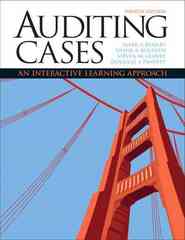Question
Respond to the following with why/why not you agree or disagree with the below statement. Even when a case seems cut and dry, every case
Respond to the following with why/why not you agree or disagree with the below statement.
Even when a case seems cut and dry, every case deserves a trial. In our country, we are "innocent until proven guilty" (also more formally called a presumption of innocence). The "burden of proof" is the prosecution's responsibility. Not only is the prosecutor required to present proof but the prosecutor is also required to persuade a jury of the said proof. There are so many questions that need to be answered and resolved prior to convicting a person. Was the person in the right state of mind to know right from wrong? Was the person coerced? Did the person act in self-defense? If any of these answers provide any valid reasoning or blur the lines on innocence or guilty, it could cause a hung jury. The prosecution must provide proof beyond a reasonable doubt, and everyone, even if they confessed to the crime, deserves to be put on trial.
The question, though, is who decides if the defendant is innocent or guilty. That's where a trial comes into play because there are checks and balances to prevent any part of our justice system from becoming corrupt or unbalanced. One singular officer taking the initial statement can be biased based on numerous reasonings, but a room full of your fellow citizens could be the best chance at redeeming your innocence. The point of a trial is to present all of the facts, statements, and evidence and allow an unbiased decision to be made. This decision, again, must be with at least ninety-five percent certainty. Everyone would agree that placing an innocent person in prison for a crime he/she didn't commit would be the worst outcome, so a trial allows both sides, innocent and guilty, to argue their points, disprove the other side, and thoroughly dissect the facts. The defense has the role of disproving facts or evidence against the defendant, and the prosecution is in charge of laying out all the facts and evidence proving the crime was committed.
Prior to a conviction, the suspect is entitled to the presumption of innocence, which is upheld through every step of the trial. With this being said, the accused still has rights that must be respected. One right that was even written into our Constitution as a Bill of Rights Amendment is the Sixth Amendment: "accused shall enjoy the right to a speedy and public trial, by an impartial jury of the state. If the defendant doesn't want a jury trial at all, he/she does have the right to also waive the option, and instead, he/she can choose a bench trial, which is a trial that appears before a judge instead of a jury. If the defendant chooses a jury trial, he/she does have the right to a fair trial, so the jurors go through a selection process called voir dire. Evidence and statements can also be disputed by the defense attorney, or they could provide an affirmative defense by revealing alibis or reasonings such as self-defense. The defendant is also not forced to testify in his trial under the Fifth Amendment.
Step by Step Solution
There are 3 Steps involved in it
Step: 1
ANSWER I largely agree with the statement that every case deserves a trial primarily because of the foundational principle of innocent until proven gu...
Get Instant Access to Expert-Tailored Solutions
See step-by-step solutions with expert insights and AI powered tools for academic success
Step: 2

Step: 3

Ace Your Homework with AI
Get the answers you need in no time with our AI-driven, step-by-step assistance
Get Started


